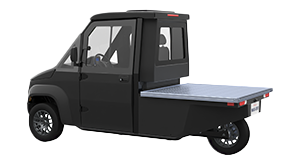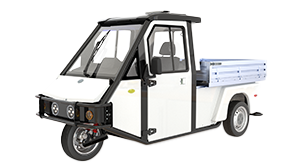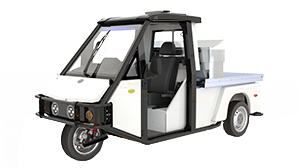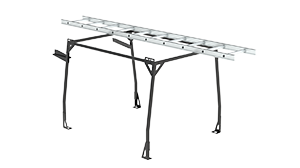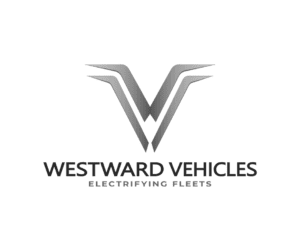Do EV Cars Save Money
The global automotive landscape is undergoing a transformative shift, driven by the growing demand for sustainable electric cars and electric vehicles (EVs) transportation solutions. As concerns about gas prices, climate change and environmental degradation mount, organizations are turning to electric vehicles (EVs) in greater numbers.
Are you wondering, “Do EV cars save money?” Well, the answer is an enthusiastic “Yes!” An electric car can reduce your carbon footprint, save you money over a gas-powered car and enhance operational efficiency. One notable player in the global EV market is Westward Vehicles, a pioneering company that harnesses the power of electricity to revolutionize utility vehicles.
We delve into the realm of electric utility vehicles, focusing specifically on the offerings of Westward Vehicles. As the world transitions away from traditional internal combustion engines to gas-powered vehicles, Westward Vehicles has emerged as a trailblazer in the domain of electric utility vehicles. These innovative EV models are designed to cater to the needs of a wide variety of industries, from construction and agriculture to logistics and municipal services.
In the face of this transition, one key aspect that demands careful consideration is cost efficiency. The economic feasibility of adopting electric utility vehicles is pivotal for your business if you aim to strike a balance between sustainability and fiscal responsibility. Exploring the cost-efficiency of Westward Vehicles’ electric utility vehicles sheds light on the financial benefits of owning an electric vehicle.
The Benefits of Electric Utility Vehicles


Electric utility vehicles (EVs) have garnered significant attention in recent years due to their numerous benefits, making them an attractive option for a wide range of industries. Electric utility vehicles manufactured by Westward Vehicles in particular offer a host of advantages that contribute to both environmental sustainability and improved cost-efficiency.
Here are some of the key benefits:
Environmental Advantages
Unlike a conventional car, EVs produce zero tailpipe emissions, significantly reducing air pollution and greenhouse gas emissions. This is crucial for industries operating in urban environments and areas with strict emission regulations.
By adopting electric utility vehicles, your organization actively contributes to combating climate change and improving local air quality.
Reduced Operational Costs
One of the most appealing aspects of electric cars is their lower operational costs compared to traditional internal combustion engine vehicles. Electric cars have fewer moving parts, which leads to reduced maintenance requirements and significant savings on fuel costs over vehicles with a gas engine.
They also eliminate the need for expensive engine oil changes and replacement of belts and spark plugs, and they have longer brake life due to their regenerative braking systems.
Energy Efficiency
Electric motors are inherently more energy-efficient than internal combustion engines, converting a higher percentage of energy from the grid to power at the wheels.
This efficiency translates into cost savings by the gasoline engine requiring more energy to make gas cars cover the same distance compared to their electric car counterparts.
Lower Fuel Costs
Electricity is generally cheaper than gasoline or diesel on a per-mile basis. Lower electricity costs can save you money over the lifetime of an electric vehicle, making it an attractive choice for those looking to reduce expenses. An electric car can save money substantially, especially compared to traditional gas-powered cars.
Additionally, electricity prices are generally more predictable than the volatile nature of fossil fuel-based gasoline prices.
Considering a switch to electric vehicles for your fleet, the financial metrics are compelling. Your current fleet size of 7 vehicles travels an average of 7,500 miles per year per vehicle, tallying up to 52,500 annual miles for the entire fleet. With a fuel cost of $3.79 per gallon, your annual fuel expenditure stands at $9,948.75—amounting to nearly $50,000 over a 5-year period. On the flip side, the average commercial cost per KW for electric charging is $0.12. This would bring your annual electric cost to a mere $1,050, or $5,250 for the same 5-year span. The numbers speak volumes: making the switch could yield an astonishing $44,493.75 in savings over five years. This isn’t just a cost-saving measure; it’s a strategic move that could significantly impact your bottom line.
Noise Reduction
Electric utility vehicles operate quietly, contributing to a reduction in noise pollution, especially in urban areas and noise-sensitive areas such as warehouses and other indoor environments. This quiet operation leads to improved working conditions for operators and reduced disturbances for nearby residents.
Incentives and Rebates
Many regions and governments offer tax incentives, tax credits and rebates towards an electric car purchase, including federal and state incentives, significantly offsetting the initial EV sales price. These incentives, along with reduced charging costs, make electric utility vehicles more cost-competitive for EV drivers compared to traditional ICE vehicles. This helps bridge the price gap between electric utility vehicles and conventional automobiles, ultimately improving cost-efficiency to save you money.
Sustainability Initiatives
As corporations and businesses increasingly adopt sustainability goals, integrating electric utility vehicles into your fleet helps achieve these objectives. It showcases a commitment to reducing environmental impact and aligns with EV owners’ expectations for responsible practices.
Flexibility in Charging
Electric utility vehicles can be charged using a variety of free charging methods, including standard electrical outlets or specialized chargers at public dedicated charging stations. This flexibility allows EV drivers to charge their electric car overnight, ensuring they start each day with a fully charged vehicle, without worrying about any traditional engine maintenance.
Understanding Westward Vehicles’ Electric Utility Vehicles
Westward Vehicles has emerged as a key player in the electric utility vehicle sector, offering a diverse range of electric cars tailored to various industries. These vehicles combine cutting-edge technology, innovative design and a commitment to sustainability and durability, making them an attractive choice for car shoppers looking to transition from conventional cars powered by gas engines to more environmentally friendly options.
Understanding the features and specifications of Westward Vehicles’ electric utility vehicles is essential for assessing their cost-efficiency. Here’s a closer look at what sets these vehicles apart:
Diverse Product Lineup
Westward Vehicles offers a comprehensive lineup of electric utility vehicles designed to cater to the unique needs of different industries. From compact electric trucks for urban deliveries to larger utility vehicles for agricultural and construction tasks, our range covers a wide spectrum of applications.
Customization Options
At Westward Vehicles, we understand that your business has unique and specific requirements. Our electric utility vehicles often come with various customization options, allowing you to configure the vehicles to meet your specific operational needs. This adaptability enhances the vehicles’ practicality and utility.
Advanced Electric Propulsion
Our advanced electric propulsion system is at the core of Westward Vehicles’ electric utility vehicles. These vehicles are equipped with efficient electric motors that provide instant torque for quick acceleration and optimal performance. The design of the powertrain ensures minimal energy wastage, contributing to extended range and improved energy efficiency.
Battery Technology
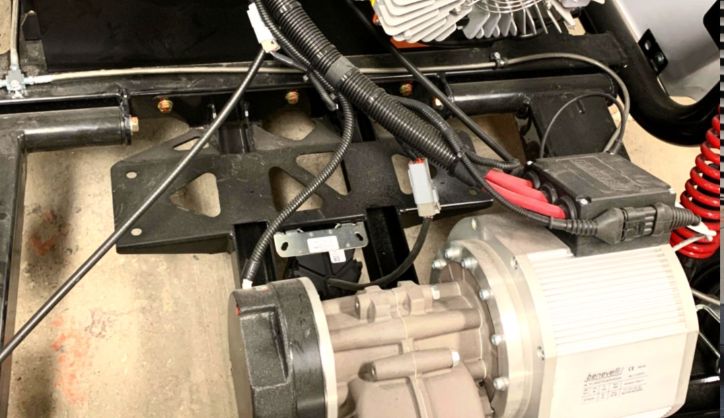
The heart of any electric vehicle is its battery system. Westward Vehicles integrates high-capacity lithium-ion battery packs into our electric utility vehicles. These batteries offer impressive range capabilities, allowing your fleet to cover significant distances on a single charge. The longevity and reliability of these battery systems contribute to the vehicles’ long-term cost-efficiency.
Regenerative Braking
Many of Westward Vehicles’ electric utility vehicles feature regenerative braking technology. This innovative system converts kinetic energy into stored electrical energy during braking, helping to recharge the battery and extend the vehicle’s range. Regenerative braking also reduces wear on traditional friction brakes, lowering maintenance costs.
Smart Charging Solutions
Smart charging solutions are advanced technologies designed to optimize the charging process for electric vehicles (EVs) and plug-in hybrid vehicles (PHEVs). These solutions utilize a combination of software, hardware and data analysis to improve charging efficiency, reduce costs, and enhance overall operational effectiveness. The electric cars from Westward Vehicles include smart charging solutions for EV owners and vehicle operators.
Safety and Ergonomics

Westward Vehicles prioritizes safety and operator comfort in the design of our electric utility vehicles. The company integrates a comprehensive approach that encompasses both safety features and ergonomic considerations.
The vehicles are equipped with ergonomic seating arrangements, promoting operator comfort during extended work hours. This ergonomic design enhances operator well-being and contributes to sustained productivity by reducing operator fatigue and discomfort. Furthermore, the inclusion of intuitive controls streamlines vehicle operation, allowing operators to focus on their tasks without unnecessary complexity.
Westward Vehicles goes the extra mile by implementing advanced safety systems, guaranteeing a secure working environment for operators. These safety features encompass technologies designed to prevent accidents, mitigate risks, and safeguard the operators and vehicles. Combining ergonomic design with cutting-edge safety measures, Our vehicles deliver electric utility vehicles that ensure operator satisfaction and operational efficiency.
Durability and Build Quality
Our commitment to quality and durability ensures that our electric utility vehicles are built to withstand the demands of various industries. Robust construction and high-quality components contribute to reduced maintenance requirements and extended vehicle lifespans beyond the industry average.
By understanding these features and specifications, your business can evaluate how Westward Vehicles’ electric utility vehicles align with your operational needs and financial goals. The combination of advanced technology, customization options, and a focus on sustainability positions these vehicles as compelling options for those seeking to transition from ICE cars to an electric vehicle.
Factors Influencing Cost-Efficiency
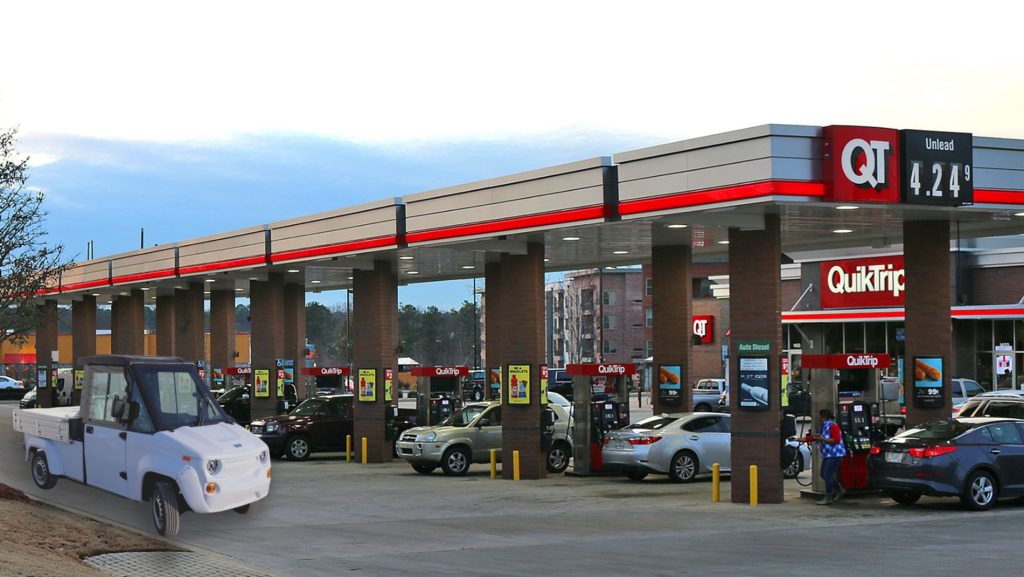
The cost-efficiency of owning an electric vehicle is influenced by several key factors, including EV prices and the potential benefits of EV purchase incentives such as tax incentives or tax credit. Understanding these factors is essential for EV buyers and organizations seeking to make fleet transitions in light of high gas prices and potential benefits from the Federal EV tax credit.
Here are the primary factors that influence the cost-efficiency of Westward Vehicles’ electric utility vehicles:
Initial Purchase Price and Incentives
The initial cost of purchasing a Westward Vehicles electric utility vehicle is a significant factor in its affordability. While electric vehicles often have a higher upfront price compared to their internal combustion engine counterparts in gas cars, federal government incentives, tax credits and rebates substantially offset this cost. Your business should carefully assess available federal tax credits and incentives to determine their impact on the final cost of qualifying vehicles because electric vehicles save money in many cases.
Charging Infrastructure Costs
Establishing a charging infrastructure for your new Westward Vehicles electric utility vehicles is essential. The cost of installing charging stations at your business location and potentially for remote operations should be factored into the overall cost-efficiency analysis. Your business needs to consider installation, equipment, and ongoing maintenance costs.
Charging vs. Refueling Costs
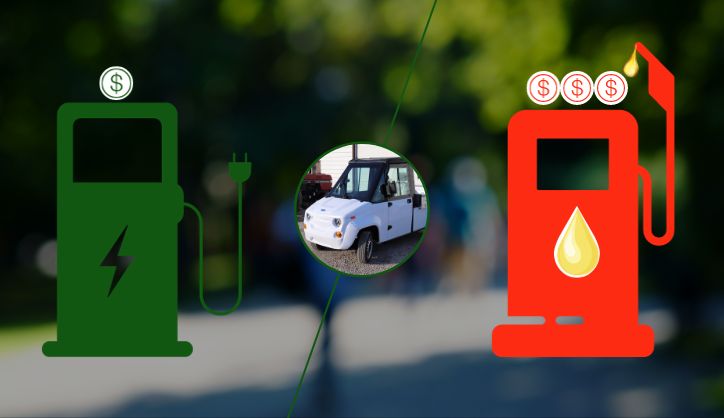
The cost of electricity for charging Westward Vehicles electric utility vehicles is generally lower than the cost of gasoline or diesel fuel, depending on electricity rates per kilowatt hour and the rates at your local gas station. Your business needs to compare the ongoing operational expenses of an electric engine and charging EVs to the refueling costs of gas-powered cars. Calculating the cost per mile/kilometer for both a gas-powered vehicle and an electric car provides insight into potential savings.
Maintenance and Repair Costs
Westward Vehicles electric utility vehicles typically have fewer moving parts compared to internal combustion engine gas cars. This leads to lower maintenance costs and lower repair costs over the vehicle’s lifespan. Reduced requirements for engine maintenance, oil changes, spark plugs, belts, and other costly repairs contribute to long-term cost savings.
Resale Value and Total Cost of Ownership (TCO)
Westward Vehicles’ electric vehicles tend to have a higher resale value than traditional vehicles due to their lower wear and tear and longer lifespan. Calculating the total cost of ownership, which includes purchase price, operating costs (including the electric bill) and resale value, provides a comprehensive perspective on the vehicle’s financial impact over its lifecycle.
Energy Costs and Usage Patterns
Understanding energy consumption patterns is essential for accurately estimating charging costs. Factors such as the vehicle’s energy efficiency, driving distance, payload capacity and terrain can influence energy consumption. Analyzing real-world usage scenarios helps project operational expenses.
Financing Options
Different financing options, including leasing and loans, impact the immediate cash flow and long-term financial outlook for adopting electric utility vehicles. Your business should explore various financing arrangements to determine the most cost-effective approach.
Sustainability Benefits and Corporate Image
While not directly tied to financial metrics, the sustainability benefits of Westward Vehicles electric utility vehicles positively impact your business’s reputation and brand image. Demonstrating a commitment to environmental responsibility can attract customers, investors, and partners.
Future Outlook and Industry Trends

The future outlook and industry trends surrounding electric utility vehicles are critical considerations for businesses aiming to make informed decisions about their adoption. Understanding the direction in which the industry is headed can provide insights into the long-term cost-efficiency and sustainability of integrating Westward Vehicles electric utility vehicles. Here are some future trends to keep in mind:
Advancements in Battery Technology
Advancements in EV batteries have led to energy density and capacity improvements, allowing electric vehicles to cover longer distances on a single charge. These developments are reducing EV costs and making them increasingly competitive with conventional cars, especially in light of the drawbacks associated with gas engines and high gas prices.
Infrastructure Expansion
The growth of charging infrastructure is a pivotal trend. Governments, businesses and charging networks are investing in expanding charging station networks, enabling both electric car owners and utility vehicle operators to access reliable and convenient charging options. This trend reduces charging-related challenges and contributes to operational efficiency.
Regulatory Support
Many governments worldwide are introducing stricter emissions regulations and incentives to promote EV adoption. Increasing regulatory support includes a federal tax credit for electric vehicles, including utility vehicles. This can further enhance the cost-efficiency of these vehicles by offering financial incentives and tax credits while encouraging sustainable practices.
Cost Parity with Traditional Vehicles
As technology advances and economies of scale are achieved, the cost of electric utility vehicles is expected to decrease. This will make EVs even more competitive with traditional vehicles in terms of upfront costs and purchase price, further improving their cost-efficiency.
Integration of Renewable Energy

The integration of renewable energy sources, such as solar panels and wind turbines, into charging infrastructure by local utility companies can reduce the environmental impact and energy costs associated with operating electric utility vehicles. Your business can generate its own electricity, minimizing reliance on the electric grid and reducing long-term operating electricity costs as well.
Data-Driven Fleet Management
Advanced data analytics and fleet management software are becoming essential tools for optimizing electric utility vehicle operations. Predictive maintenance, route optimization and energy consumption monitoring all contribute to enhanced cost-efficiency by reducing downtime and maximizing vehicle utilization.
Wider Range of Vehicle Options
The electric utility vehicle market is diversifying rapidly, offering a broader range of vehicle sizes, configurations, and sticker prices. Businesses and organizations can now find electric utility vehicles that match their specific operational needs, further improving cost-efficiency and reducing reliance on conventional cars powered by gas engines.
Transition to Autonomous Driving
While still evolving, autonomous driving technology has the potential to impact electric utility vehicles’ efficiency and cost-effectiveness. Autonomous features can lead to optimized route planning, reduced driver fatigue and improved operational productivity.
By staying abreast of these trends and incorporating them into your cost-efficiency analysis, your business can make strategic decisions about adopting Westward Vehicles’ electric utility vehicles. Considering the trajectory of the industry helps ensure that the chosen solutions remain relevant and provide long-term value in terms of both financial savings and sustainability.
Conclusion
In the journey towards a more sustainable and cost-effective future, the adoption of Westward Vehicles’ electric utility vehicles presents a compelling opportunity for businesses across various industries. By reducing your maintenance costs, lowering fuel costs, and contributing to sustainability, you save money and demonstrate your commitment to responsible practices, making EV owners proud of their association with your business.
As your business navigates the transition to electric mobility, you must consider the immediate cost comparisons and the long-term impact on your operations and the environment. The benefits of reduced emissions, lower operational and maintenance expenses and potential government and federal tax credit and tax incentives contribute to a narrative of financial prudence and corporate social responsibility.
By understanding the benefits of electric utility vehicles, delving into the specifics of Westward Vehicles’ innovative offerings and carefully assessing factors such as charging infrastructure, maintenance costs and user feedback, your business can gain a comprehensive view of the cost-efficiency landscape. Furthermore, accounting for the evolving trends in battery technology, charging infrastructure expansion, and regulatory support helps paint a picture of a future where electric utility vehicles continue to become even more economically viable.
The cost-efficiency of Westward Vehicles’ electric utility vehicles is a multi-faceted evaluation that transcends immediate price comparisons. It encompasses sustainability goals, operational enhancements and long-term financial savings. As your business strives to balance your economic objectives with environmental consciousness, the embrace of electric utility vehicles emerges not just as a smart financial choice, but as a significant step towards a greener, more efficient and prosperous future.
So, what are you waiting for? Browse our latest models for more information and learn how our EVs can help transform your business and achieve the benefits you deserve.






